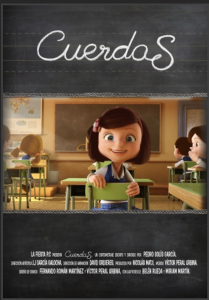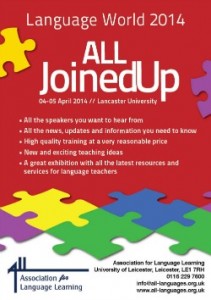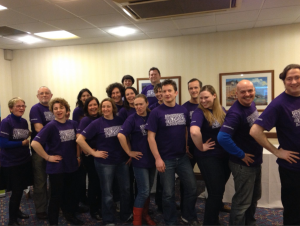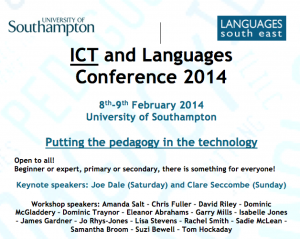My song for the ILILC3 Show and Tell is….
El pollito pio!
httpv://youtu.be/dhsy6epaJGs
If you want the actions, here’s a cute kid doing them!
httpv://youtu.be/oxuyvHLveCc
And here’s a version with the lyrics – a stronger South American accent though!
httpv://youtu.be/sEszVwMn7t8
Also available in
Italian
Dutch
German
Catalan
Portuguese
French
Greek
Cyprus version
Romanian
Lyrics :
Pulcino Pio – El Pollito Pio (Il Pulcino Pio – Radio Globo)
En la radio hay un pollito,
En la radio hay un pollito,
Y el pollito pio, el pollito pio,
el pollito pio, el pollito pio,
el pollito pio, el pollito pio.
En la radio hay una gallina,
En la radio hay una gallina,
Y la gallina coo, el pollito pio
el pollito pio, el pollito pio,
el pollito pio, el pollito pio.
En la radio hay también un gallo,
En la radio hay también un gallo,
Y el gallo cocoroco y la gallina coo,
y el pollito pio, el pollito pio,
el pollito pio, el pollito pio.
En la radio hay un pavo,
En la radio hay un pavo,
Y el pavo glu glu glu, y el gallo cocoroco,
y la gallina coo, y el pollito pio,
el pollito pio, el pollito pio, el pollito pio.
En la radio hay una paloma,
En la radio hay una paloma,
Y la paloma ruu, el pavo glu glu glu,
el gallo cocoroco, la gallina coo,
el pollito pio, el pollito pio,
el pollito pio, el pollito pio.
En la radio hay también un gato,
En la radio hay también un gato,
Y el gato miao, la paloma ruu,
el pavo glu glu glu, el gallo cocoroco,
la gallina coo y el pollito pio,
el pollito pio, el pollito pio, el pollito pio.
En la radio hay también un perro,
En la radio hay también un perro,
Y el perro guau guau, el gato miao,
la paloma ruu, el pavo glu glu glu,
el gallo cocoroco, la gallina coo
y el pollito pio, el pollito pio,
el pollito pio, el pollito pio.
En la radio hay una cabra,
En la radio hay una cabra,
Y la cabra meee, el perro guau guau,
el gato miao, la paloma ruu,
el pavo glu glu glu, el gallo cocoroco,
la gallina coo y el pollito pio,
el pollito pio, el pollito pio, el pollito pio.
En la radio hay un cordero,
En la radio hay un cordero,
Y el cordero beee, y la cabra meee,
el perro guau guau, el gato miao,
la paloma ruu, el pavo glu glu glu,
el gallo cocoroco, la gallina coo
y el pollito pio, el pollito pio,
el pollito pio, el pollito pio.
En la radio hay una vaca
En la radio hay una vaca
Y la vaca moo, y el cordero beee
y la cabra meee, el perro guau guau,
el gato miaoo, la paloma ruu,
el pavo glu glu glu, el gallo cocoroco,
la gallina coo y el pollito pio,
el pollito pio, el pollito pio, el pollito pio.
En la radio hay también un toro,
En la radio hay también un toro,
Y el toro muuu, y la vaca moo
y la cordero beee y la cabra meee,
el perro guau, el gato miaoo,
la paloma ruu, el pavo glu glu glu,
el gallo cocoroco, la gallina coo
y el pollito pio, el pollito pio,
el pollito pio, el pollito pio.
En la radio hay un tractor,
En la radio hay un tractor,
Y el tractor bruum y el tractor bruum,
y el tractor bruum y el pollito prrrr.
 I saw this short film or ‘cortometraje’ shared yesterday on Facebook and I can’t get it out of my head so I thought I’d share it with you.
I saw this short film or ‘cortometraje’ shared yesterday on Facebook and I can’t get it out of my head so I thought I’d share it with you.













